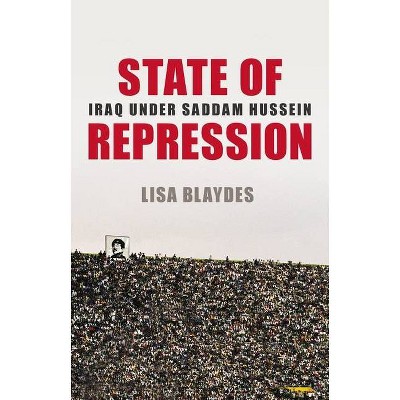State of Repression - by Lisa Blaydes (Paperback)

Similar Products
Products of same category from the store
AllProduct info
<p/><br></br><p><b> About the Book </b></p></br></br>A new account of modern Iraqi politics that overturns the conventional wisdom about its sectarian divisions. How did Iraq become one of the most repressive dictatorships of the late twentieth century? The conventional wisdom about Iraq's modern political history is that the country was doomed by its diverse social fabric. But in State of Repression, Lisa Blaydes challenges this belief by showing that the country's breakdown was far from inevitable. At the same time, she offers a new way of understanding the behavior of other authoritarian regimes and their populations. Drawing on archival material captured from the headquarters of Saddam Hussein's ruling Ba'th Party in the wake of the 2003 US invasion, Blaydes illuminates the complexities of political life in Iraq, including why certain Iraqis chose to collaborate with the regime while others worked to undermine it. She demonstrates that, despite the Ba'thist regime's pretensions to political hegemony, its frequent reliance on collective punishment of various groups reinforced and cemented identity divisions. In addition, a series of costly external shocks to the economy--resulting from fluctuations in oil prices and Iraq's war with Iran-weakened the capacity of the regime to monitor, co-opt, coerce, and control factions of Iraqi society. In addition to calling into question the common story of modern Iraqi politics, State of Repression offers a new explanation of why and how dictators repress their people in ways that can inadvertently strengthen regime opponents.<p/><br></br><p><b> Book Synopsis </b></p></br></br><p><b>A new account of modern Iraqi politics that overturns the conventional wisdom about its sectarian divisions</b> <p/>How did Iraq become one of the most repressive dictatorships of the late twentieth century? The conventional wisdom about Iraq's modern political history is that the country was doomed by its diverse social fabric. But in <i>State of Repression</i>, Lisa Blaydes challenges this belief by showing that the country's breakdown was far from inevitable. At the same time, she offers a new way of understanding the behavior of other authoritarian regimes and their populations. <p/>Drawing on archival material captured from the headquarters of Saddam Hussein's ruling Ba'th Party in the wake of the 2003 US invasion, Blaydes illuminates the complexities of political life in Iraq, including why certain Iraqis chose to collaborate with the regime while others worked to undermine it. She demonstrates that, despite the Ba'thist regime's pretensions to political hegemony, its frequent reliance on collective punishment of various groups reinforced and cemented identity divisions. At the same time, a series of costly external shocks to the economy--resulting from fluctuations in oil prices and Iraq's war with Iran--weakened the capacity of the regime to monitor, co-opt, coerce, and control factions of Iraqi society. <p/>In addition to calling into question the common story of modern Iraqi politics, <i>State of Repression</i> offers a new explanation of why and how dictators repress their people in ways that can inadvertently strengthen regime opponents.</p><p/><br></br><p><b> Review Quotes </b></p></br></br><br>Honorable Mention for the Luebbert Best Book Award, Comparative Politics Section of the American Political Science Association<br><br>It is out of the question that <i>State of Repression</i> is the product of very impressive scholarly research and analysis.<b>---Sophia Hoffmann, <i>Journal of Perpetrator Research</i></b><br><br>One of Choice Reviews' Outstanding Academic Titles of 2018<br><br>What a tonic Lisa Blaydes's new book is. . . . Blaydes deserves a medal for a book that is impeccably researched and challenges so many myths with calm objective analysis. Her argument is one in the eye for those who say the modern state is incompatible with Islam.<b>---Tim Stanley, <i>Daily Telegraph</i></b><br><p/><br></br><p><b> About the Author </b></p></br></br><b>Lisa Blaydes</b> is associate professor of political science and senior fellow at the Freeman Spogli Institute for International Studies at Stanford University. She is the author of <i>Elections and Distributive Politics in Mubarak's Egypt.</i>
Price History
Cheapest price in the interval: 24.99 on October 23, 2021
Most expensive price in the interval: 24.99 on November 8, 2021
Price Archive shows prices from various stores, lets you see history and find the cheapest. There is no actual sale on the website. For all support, inquiry and suggestion messagescommunication@pricearchive.us




















